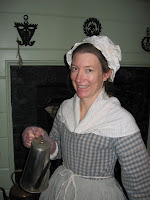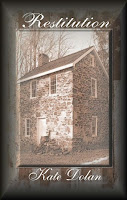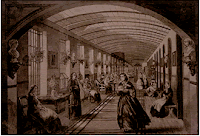

 Welcome, Kate! Tell us about your road to becoming a writer of Traditional Regencies for Cotillion.
Welcome, Kate! Tell us about your road to becoming a writer of Traditional Regencies for Cotillion.
I set my first two books Langley’s Choice (Zumaya Publications) and Restitution (Cloonfad Press) in Maryland since I live here and thought it would be easiest to research in my own backyard. It was tremendously interesting to research colonial life, but not as easy as I’d expected–although my experience as a living history interpreter helped–since Maryland has not traditionally received as much study as New England, Virginia, etc. The editor of my first book observed that it was obvious I was a Jane Austen fan, so I decided to try to write a Regency before the publishers dropped the lines entirely.
I was too late. By the time I had the story revised and ready to send out, the publishers had already frozen new acquisitions, and soon they announced the end. I was surprised to learn that Ellora’s Cave decided to bring out a traditional Regency line–after all, they’re not known for books with lots of witty dialogue from fully clothed heroines. But not only are they launching the line, they’re really supporting it with ad money and an earlier than usual print launch. They’re fighting a tough battle though, because their main print seller, Borders, says they won’t stock traditional Regencies.
I was surprised to learn that Ellora’s Cave decided to bring out a traditional Regency line–after all, they’re not known for books with lots of witty dialogue from fully clothed heroines. But not only are they launching the line, they’re really supporting it with ad money and an earlier than usual print launch. They’re fighting a tough battle though, because their main print seller, Borders, says they won’t stock traditional Regencies.
What’s your Cotillion debut, A Certain Want of Reason, about?
It’s the story of a guy who decides that the best way to get out of a bad engagement is to pretend he’s crazy. The heroine, who has spent most of her life watching out for a younger brother and sister who really do have mental issues, is somewhat less than pleased when she learns that the hero would stoop so low just to break an engagement. In a way, the book shows that everyone, certainly those in society, exhibit a want of reason at times.
How did you research the topic of madness and its treatment in the Regency, and what interesting facts did you turn up? I found an excellent, detailed history of Bedlam, or Bethlem Hospital, as the institution prefers to be known. I had no idea that the facility began treating mentally ill patients back in the middle ages, nor had I realized that by the 18th century, the physicians actively worked to cure patients. I thought they just locked them up to keep them from bothering people. My research on Bethlem provided the date for the story–I decided it should be set soon after the hospital moved to St. Georges Fields, because the layout of the buildings at that location worked better for the scenes where the heroine and her friend disguise themselves as nuns to sneak her brother out. Thank heavens for inter-library-loans!
I found an excellent, detailed history of Bedlam, or Bethlem Hospital, as the institution prefers to be known. I had no idea that the facility began treating mentally ill patients back in the middle ages, nor had I realized that by the 18th century, the physicians actively worked to cure patients. I thought they just locked them up to keep them from bothering people. My research on Bethlem provided the date for the story–I decided it should be set soon after the hospital moved to St. Georges Fields, because the layout of the buildings at that location worked better for the scenes where the heroine and her friend disguise themselves as nuns to sneak her brother out. Thank heavens for inter-library-loans!
You’re a very diverse writer. Tell us about your other projects, and your next book.
I have a three-book series of contemporary cozy mysteries coming out with Barbour Books, but since they’ve pushed back the launch of their new mystery line until next year, I’ve been able to set those aside for a while to keep working on the historicals. (And I’ve managed to sneak history into the contemporaries as well. The first one, George Washington Stepped Here, deals with conflicts between living history interpreters at a historic site. And the sequel deals with an antique gallery.) This May, I have a book coming out about another of my favorite subjects, pirates. (And I could go on for a long time, so I won’t even get started.) I had so much fun writing Avery’s Treasure (Zumaya Publications) that I felt rather let down when I finished the first draft. I wanted to crawl into the book and live there (probably because it’s set in the Caribbean and Bahamas while I’m stuck wintering much further north). Right now, I’m just finishing the first draft of the sequel to A Certain Want of Reason. This is the story of what happens to the sisters left behind in London while everyone else is breaking out of Bedlam, etc. It’s actually as much fun as writing about the pirates, but with no rum or tropical islands.
This May, I have a book coming out about another of my favorite subjects, pirates. (And I could go on for a long time, so I won’t even get started.) I had so much fun writing Avery’s Treasure (Zumaya Publications) that I felt rather let down when I finished the first draft. I wanted to crawl into the book and live there (probably because it’s set in the Caribbean and Bahamas while I’m stuck wintering much further north). Right now, I’m just finishing the first draft of the sequel to A Certain Want of Reason. This is the story of what happens to the sisters left behind in London while everyone else is breaking out of Bedlam, etc. It’s actually as much fun as writing about the pirates, but with no rum or tropical islands.
And the Riskies question: What are the risky elements of A Certain Want of Reason? I think some of the subject matter is politically incorrect. There are characters in a rich asylum in the country playing chess with toys and bowling in the hallways, etc. I will make fun of anyone, if given the chance. Nothing is sacred.
I think some of the subject matter is politically incorrect. There are characters in a rich asylum in the country playing chess with toys and bowling in the hallways, etc. I will make fun of anyone, if given the chance. Nothing is sacred.
The book is also risky because it’s ridiculous and unrealistic. It’s a goofy, silly, Wodehouse world, and the romantic relationship is probably not any more realistic than the rest of the book. I spend enough time in the real world. When I read or write, I want to go someplace else.
Come and chat with Kate–as usual, a question or comment makes you eligible to win a copy of A Certain Want of Reason, today only!

I’m glad you are writing about important characters left behind by the first book- I like to read about what happened next and the compelling characters in the sidelines.
One of the limits of a shorter book like a traditional Regency is that you can’t cover the stories of the supporting characters as much as you want. The heroine in A Certain Want of Reason is forced by circumstances to leave London to help her brother, but she has to leave her younger sister, Helen, behind. I started to wonder what sort of trouble Helen might get into! But as the story developed, I realized that despite her odd behavior, Helen is quite an interesting young woman who has a lot to offer the world. She has been undervalued by almost everyone–including me. So even though she remains a supporting character in the second book, her story has been most gratifying to discover.
It took me three tries at “word verification” before I could get that last comment published.
Blogger needs a good slap with a wet noodle…
This was a very interesting interview. I’m wondering what a living history interpreter is.
guy who decides that the best way to get out of a bad engagement is to pretend he’s crazy and the heroine has dealt with issues of such nature:
My oh my, it should be interesting to find out to what lengths the hero goes to prove he’s crazy and how the heroine handles these situations. I’m expecting some humor here.
I’ve purchased Kate’s book from Cerridwen Press and although I haven’t had time to finish it, I was hooked on page 1. This is definitely different than the usual Regency beginning. Not that I don’t like usual Regency beginnings. I like most Regencies. But Kate’s promises to lead us in directions not usually taken in Regencies. Way to go, Kate! I’m really looking forward to seeing more from you in the future.
Kate, I just bought A Certain Want of Reason last week–my first ever ebook purchase! I recognized the story from having judged it in a contest last year. Even though I’m usually a fan of the more gritty and realistic stories, I remember being charmed by your characters and your voice, so I’m glad to have the chance to find out what becomes of them.
Hi, Kate!
It is wonderful to have you here with the Riskies. You certainly belong. Not only am I intrigued by your Regency madness premise, but I’m awed by the diversity of what you write! Wow.
(see you next week! I’m going to meet Kate at a Tea next week!)
Cheers,
Diane
An extremely interesting interview which gives me more of a background regarding your new novel.
Fascinating book which has a great deal of research involved. love to read this story which is unique.
Your interview has been most enlightening. The subject matter is certainly different and lends itself to your new novel.
I’m so glad that the more tradition Regencies are going to be offered by Cotillion. I just found historical romance about 2 years ago and I really enjoyed reading TR’s (when I could find them). A Certain Want of Reason sounds interesting and I’m adding it to my TBR list.
~Wanda
Your interview is great! This book gives me great insight into how your research does influence your story.
Your profession and experience sounds wonderful. Was training involved in order to gain experience. Lovely interview.
Kate, tell us about your experiences as a living history interpreter.
Dear Kate,
Were you inspired by either the madness of King George, or the “elegant madness” of society behavior?
I enjoyed what you said about no topic being too sacred to be made fun of. I’m trying to discover the line between playing against genre constraints, building useful tension that way, and going too far into satire and losing the targeted reader.
Have you run into that?
An interesting and unique story which would be great to enjoy, with humor as well. Loved the interview. Hope to read this special book soon. Characters sound real and compelling.
Great interview. I also like to escape into my books. I read the opening of your book, and was immediately intrigued and a little concerned because of the subject matter and how you would handle it. I too thought that Bethlem merely locked people away. Learning that the doctors were actually working toward cures is a relief. And laughter is a great way to deal with an uncomfortable topic.
Sorry about the delay in responding (I was out shopping for tile and toilets).
A describe a living history intepretter as “a reenactor without a gun.” But actually, lots of the men and women who attempt to recreate battlefield settings call themselves living history interpretters, so my definition may only make sense for me. In any case, my involvement usually consists of dressing in period clothing (about 1770s) and spending the afternoon at a historic site, usually Jerusalem Mill village in Gunpowder Falls State Park. We interpret women’s roles, which means usually cooking. Some of the more talented members of the group spin, prepare elegant dishes, tan hides, build muskets, etc. If I’m doing something other than cooking (or talking) it’s sewing. I make some clothing for myself (the simple things like petticoats and aprons) and for my family (I’ve made my husband a truly hideous, ill-fitting waistcoat, among other things). They don’t usually join me on the afternoon trips, but a couple of times a year we go to market fair events and camp for 3-5 days. These events are open to the public during the day, and reserved for campers in period clothing at night. They’re a great place to go to ask questions, because most of the living history types who attend really love history and are dying to share what they’ve learned. They do research not to get published or stun the world with a new theory, but just because they really want to know “how things were done.” And we’re all learning, all the time. It gives me great insight into some of the little aspects of daily life in the days before electricity, etc.
Jane, you asked if I was inspired by the madness of King George. And while that would be the period correct inspriation, I must confess that I was probably inspired by hearing the crowd shout “charge” at a baseball game (after the duh duh duh, duh da). It always reminds me of Teddy charging up the stairs in the movie Arsenic and Old Lace. I started trying to imagine how having a brother like that could really mess up your life. And while in real life, it would not be funny most of the time, I wanted the goofy humor of the situation, not the tragedy of it. So I figured those who take it seriously will be angered by my flippant treatment of the subject. The weird thing is that the first person to review the book did apparently take it seriously, and didn’t find it funny much at all, but still liked it well enough in the end. I will be very interested to see what others think (so email me your thoughts! You can reach me at mail@katedolan.com)
These characters are fascinating and the subject matter interesting as well. Your interview was great! Will look for the book.
Great interview! Your work sounds interesting and humorous. I can’t wait to read A Certain Want of Reason and it’s sequel. I love traditional Regencies and I hope Cotillion keeps them around!!
Cat =^..^=
After reading the interview I am looking forward to reading this book. I always found the idea of Bedlam fascinating, whenever I get the time I might just research it for the sake of learning
Yay, I love unrealistic books, and any kind of politically uncorrectness (is that a word) does it for me)
This is marvelous! I can’t wait to read your books.
As soon as I read Borders was fighting carrying trad Regencies, I immediately wanted to start a letter writing campaign to protest. Do you know who else they’ll sell their print copies to?
Good luck on your future books!